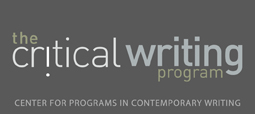Music
An Overview of the Discipline
Music has three major sub-disciplines:
- Music History/Musicology - the study of music in its historical context, its composers, and related aspects.
- Music Theory - the study of music's structure.
- Ethnomusicology - the study of music in its cultural context.
Writing in these three sub-disciplines differs mainly in selecting appropriate evidence.
Writing in the Discipline
Goal
Music is an interpretive field. Writing in music aims to affirm or critique a position. Papers point to a concept or interpretation of a text and show how it is correct or incorrect.
Evidence
Evidence in music is text-based. One of the most difficult forms of evidence is sound. Selecting the appropriate vocabulary to encompass played music or a sound depends on metaphor and audience. Audience determines whether vocabulary should be technical or easily understandable by a general audience.
Music History relies on historical and biographical evidence. Assessing music in its historical cultural context may cross into other disciplines, such as anthropology. This may introduce the need to consider what counts legitimate evidence for those cross-disciplines as well.
Music Theory relies on evidence from sheet music and musical scores, which as "hard," or dindisputable, evidence. Using sheet music and scores as evidence can be challenging due to the materiality and ephemerality of music. Music has two components: its written form and how it's playing in a specific moment. How it's playing in a specific moment can be ephemeral making it hard to capture and translate as "hard evidence."
Ethnomusicology relies on evidence from three categories: interviews, virtual ethnographies, and participant observation. Interviewing involves asking a select group of people the same questions and comparing their answers. Virtual ethnographies are interviews and discussions conducted online, rather than face-to-face. In participant observation, the ethnographer either lives amongst the people being studied to better understand their community or spends time simply observing and talking to people to understand how they make sense of their lives.
Authorship
Writing in music is single-authored. For the most part, as Professor Jeffrey Kallberg describes scholars in music, "We are a bunch of loners." Music tends to be an individualistic field because it generally relies on musical and textual interpretations. However, increasingly more people are completing joint projects rather than solely individualized work.
Writing Tips
Important Criteria for Student Writing
Reasoning and evidence, originality, and organization are the most important criteria for student writing. Grammar and mechanics, style, and following assignment directions are also important but not as important as the former three criteria.
Common Errors
- Inappropriate or inadequate evidence. Students often err on what counts as evidence, or just omit it entirely.
- Not conceiving of ideas in an original or different ways. This is common in Music Theory, where students sometimes give static descriptions of music ("This happened, then that..."), which do not frame the piece of music. Students need to learn the process of "selecting," i.e. taking parts of the music that support some conclusion.
- Across the sub-disciplines of Music, students have difficulty choosing appropriate vocabulary to describe sound evidence, especially when using metaphors.
- In part because music is abstract, avoid claiming something is indisputable and universal.
Style
Metaphors are not only appropriate but necessary to describe sound in writing. Students need to realize that using this language is important and not something to shy away from or be embarrassed about.
Genre
Student Assignments
Student writing assignments typically include:
- Essays
- Essay-responses on exams
- Short timed essays
The main variation in assignments depends professional level within the discipline. For example, Professor Jeffrey Kallberg asks non-majors tackle big issues in musical pieces. He expects majors to use more technical vocabulary, making student tasks more challenging but also more interesting. For graduate students, writing should be of publishable quality.
Professional Writing
Examples of professional writing include:
- Books
- Articles
- Essays
- Program Essays for CDs
- Program notes for concerts
The article below is an example of professional writing in the field of Music History. Highlighted text refers to examples of Authorship, Goals, Reasoning, Evidence, Style, and Claims/Rankings within the article (in order listed). To see comments and explanation for highlighted text, save the pdf article to your computer, open with Adobe Reader, and select "Comment" in the top right corner of your screen.
"The Harmony of the Tea Table: Gender and Ideology in the Piano Nocturne" by Jeffrey Kallberg© 2013 The University of Pennsylvania
Meet the Professors

Professor Jeffrey Kallberg
"I am a compulsive reviser. Whenever I come back to my paper after being away from it, the first thing I do is read it over again and revise." More...
"Showing evidence of what has been said when you are talking about music is always very difficult. You are giving a verbal form to something that seems to challenge language. And yet, it is precisely because of that that people don't stop talking about music." More...

